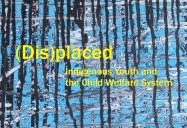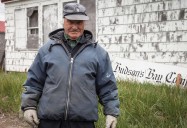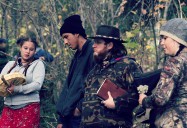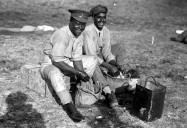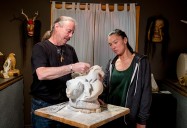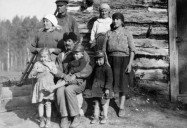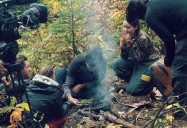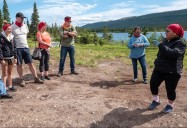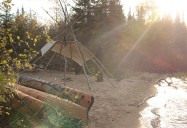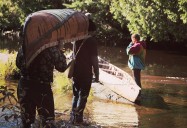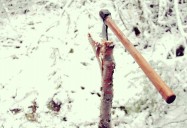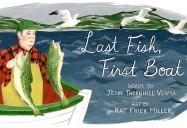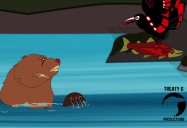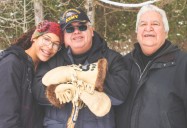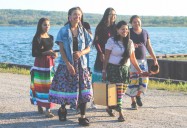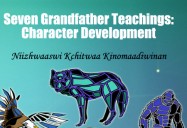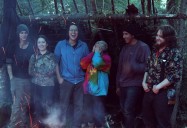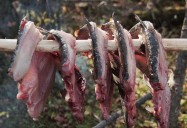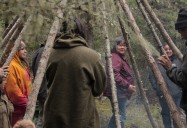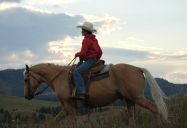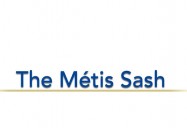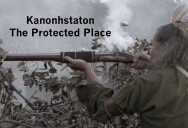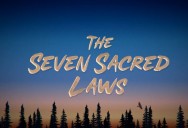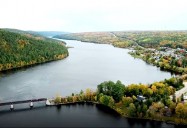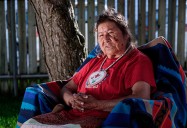
- TDSB: Art
- TDSB: Black History
- TDSB: Canadian & World Studies
- TDSB: Canadian Social Studies & First Nations
- TDSB: Career Studies & Character Ed
- TDSB: Equity & Diversity Studies
- TDSB: Financial Literacy
- TDSB: Food, Fashion & Clothing
- TDSB: Health & Phys Ed
- TDSB: Health/Safety/Abuse
- TDSB: Language
- TDSB: My Job Rocks Series - Career Education
- TDSB: PBS Playlist
- TDSB: Science
- TDSB: Social Sciences & Humanities
- TDSB: Social Studies
TDSB: Canadian Social Studies & First Nations
Asian Immigration Experiences: Journeys to Canada Series
Width Height
Subject(s): Canadian History, Canadian Social Studies, Canadian World Studies, History, Social Studies
Grade Level: 6 - 8, 9 - 12, Post Secondary
This program examines the experiences of Chinese, Japanese and South Asian immigrants in Canada. These people ventured to Canada for various reasons including work, escaping war and poverty in their homeland and the lure of a young growing nation. Canada held hope with work on the railway, a gold rush and free land. This program investigates the "push" and "pull" factors that influenced their arrival here and the problems, including racism, they encountered.
|
Running Time: 18:00 Country of Origin: Canada Captions: |
Producer: Past Perfect Productions/6801260 Manitoba Inc. Copyright Date: 2017 Language: English |
Video Chapters
-
Asian Immigration Experiences: Journeys to Canada Series 18:00
This program examines the experiences of Chinese, Japanese and...
TRANSCRIPT
Close- Canada is a nation with a multicultural identity. People from around the world have migrated to this country and are often welcomed as new Canadians. But there are times when some of Canada's population express concerns and anger over certain groups of immigrants. From the mid-1800s to the mid-1900s, people coming to Canada from parts of Asia faced intense forms of racism, including laws that kept them from having a fair and just place in Canadian society.
- [MUSIC PLAYING]
- Chinese Canadians are one of the largest ethnic groups in the country. The arrival of Chinese migrants in Canada dates back to the 1700s, but the first large wave of Chinese immigration began in 1858. When gold was discovered in the Fraser Valley, thousands of prospectors, including many Chinese working in California, rushed to the region. Chinese laborers also came directly from China.
- The area in which they came from, southern China, was very poor. Canada became known as gold mountain, [CHINESE]. And gold mountain referred to Canada as a place of opportunity.
- In 1871, British Columbia became Canada's sixth province after the Canadian government promised to build a railway connecting the Pacific coast with the rest of the country. The railway construction began another wave of Chinese immigration, as more than 15,000 workers were recruited from China to provide labor in the construction of the Canadian Pacific Railway.
- It was hard work. It was long hours. They were paid half the amount of the other European workers.
- Chinese laborers often lived in camps along the railway and were given the most dangerous construction jobs, such as tunneling, working with explosives, and carrying massive rocks. The results of the dangerous work were that over 600 Chinese laborers died on the job while building the Canadian Pacific Railway.
- They've been associated with this idea that they were disposable, renewable workforce, that when people died, more could be recruited to come over.
- When the large scale railway work was finished, as was the case with the end of the gold rush, the large numbers of Chinese laborers were no longer needed.
- So this is a pattern you see throughout history in Canada and the way in which migrants are treated. There's an initial need, right, to fill a labor shortage. And once that labor shortage has been filled, the Chinese are pushed out.
- Many Chinese Canadians looked for opportunities in Vancouver and Victoria, while others traveled east to cities like Winnipeg, Ottawa, and Montreal. But they are not always made to feel welcome, as some politicians, white union workers, and members of the general public see them as a threat.
- They want to preserve jobs for the white European migrant, and so they decide that a way to keep the Chinese from coming is to enact the Chinese Immigration Act.
- In 1885, the government passed the Chinese Immigration Act, which forced every Chinese person entering Canada to pay a $50 head tax. Chinese immigrants were the only group having to pay such a tax.
- People were trying to keep the Chinese from coming, from staying, from bringing over their families. That didn't work.
- In 1901, the government raised the head tax to $100. In 1903, it was raised again, to $500. While a large amount of money at the time, many Chinese immigrants paid the $500 per person head tax. But for most, the cost to bring an entire family was too high.
- It became impossible to bring families over, and so that dream of reuniting a family, right-- your wife and your children who were stuck in China just couldn't come over, because it was $500 a person to come.
- While the head tax slowed Chinese immigration, large numbers were still arriving in the early 1900s, angering many white British Columbians. In 1907, the anger boiled over in Vancouver. People calling for a white Canada rioted through Vancouver's Chinatown and Japantown districts. Residents of those areas were attacked. Homes and businesses were vandalized.
- In 1920, anti-Asian politicians in BC used the Dominion Elections Act to deny Chinese Canadians the right to vote in provincial and federal elections. Three years later, the government made changes that drastically reduced the amount of Chinese immigrants entering the country.
- The Canadian government just said, OK, we'll get rid of the head tax. And in 1923, they passed a new version. And what it did was, it excluded all but the most elite Chinese from coming to Canada.
- The Exclusion Act remained in place during the early 1940s. While Chinese Canadians had limited rights, many decided to enlist in the Canadian military, fighting for Canada during World War II.
- They enlisted. They were fiercely proud of the nation, even though the nation wasn't overly welcoming to them all the time.
- After the war, groups within Canada and internationally were lobbying the Canadian government to treat Chinese Canadian citizens as equals.
- On top of that, the Chinese Benevolent Association had been lobbying the federal government from coast to coast. It was many, many years of effort on the part of the Chinese community to lobby for the repeal of the Chinese Immigration Act, which finally came to the delight of the Chinese community.
- In 1947, the government repealed the 1923 Chinese Exclusion Act. By the end of the '40s, Chinese Canadians had the right to vote all across Canada. Decades later, after considerable lobbying from the Chinese Canadian community, on June 22, 2006, Prime Minister Stephen Harper formally apologized for Canada's treatment of Chinese immigrants between 1885 and 1947.
- On behalf of the people and government of Canada, we offer a full apology to Chinese Canadians for the head tax and express our deepest sorrow for the subsequent exclusion of Chinese immigrants. [CHINESE]
- The apology means more to us than anything else, because it's at least acknowledgement of the wrong that been done to the Chinese people.
- People from Japan have immigrated to Canada since the late 1870s.
- Most of them arrived here to try to establish a better life for themselves, to seek opportunity, like most immigrants to this country.
- Many settled on farms, in pulp mill towns, and fishing villages along the British Columbia coast. Others settled in the cities of Victoria and Vancouver.
- Because they faced so much racism, so much prejudice and discrimination, they established their own businesses and worked within a community largely of other Japanese Canadians. There was an area in Vancouver, for example, known as Powell Street area or what was then termed Japantown.
- As with Chinese immigrants, many white Canadians viewed those of Japanese descent as undesirable and unworthy of full rights in Canada. Laws were enacted that removed their voting rights and banned them from many professions. For the work they did get, they were paid less than white Canadians doing the same job.
- In 1928, the Canadian government limited immigration to 150 Japanese people per year. During the Great Depression, the BC government limited fishing licenses to Japanese Canadians. Then in 1940, all Japanese immigration was cut off when Japan became an ally of Germany during World War II. After the Japanese military attacked Pearl Harbor in December 1941, anti-Japanese sentiments in North America reached new heights.
- Fears were exacerbated, and they were exacerbated in the large part BC politicians.
- For those who felt Japanese Canadians could never be true Canadians, the attack on Pearl Harbor gave them the excuse to force a mass evacuation from the coastal areas of British Columbia. In 1942, Ottawa invoke the War Measures Act and removed 22,000 Japanese Canadians from the West Coast. All their possessions-- their homes, their farms, their businesses, their personal items-- were taken and sold by the Canadian government.
- And the majority lost everything they owned and everything they had worked for. And they lost opportunity as well.
- Most were sent to internment camps in the interior of BC. Many children grew up in these camps, including well-known environmentalist David Suzuki and writer Joy Kogawa. When asked later in life about their times in these internment camps, many described their childhood experiences as pleasant.
- They actually felt that's those times were fun, because they were children, and they didn't suffer the loss of property and in ways that their parents did. If you asked them what was the experience like for your mother or your father, they definitely did not say fun. They say it saddens them to even think about what their parents went through.
- For the rest of the Second World War, the status of what would happen to those interned was unclear.
- People talked at length about the uncertainty. And that was painful. They didn't know what was happening to them, how long they would be away, when they would see friends and neighbors and relatives.
- The internment camps holding Japanese Canadians were not closed until 1946, eight months after the war's end. Even after their release, Japanese Canadians were still not allowed to return to the West Coast. Finally, in 1949, the last restrictions on Japanese Canadians were lifted. They gained full voting rights and the freedom to live anywhere in Canada, but the property taken by the Canadian government was not returned.
- From the 1950s to the '70s, many Japanese Canadians found it easier continuing their lives by largely forgetting the forced relocation from World War II. But in the late 1970s, a large scale redress campaign was taking shape. Events were taking place across Canada where Japanese Canadians shared their stories from World War II, stories the younger generation were largely unaware of.
- They had no idea, and no one talked about it, and so they were shocked. And so some of these people are really upset that their parents for not telling them. And the parents' reaction is, well, it's something you likely didn't want to know about anyways.
- After a lengthy redress campaign, in 1988, an agreement with the federal government was reached. Prime Minister Brian Mulroney formally apologized to Japanese Canadians.
- The government of Canada wrongfully incarcerated, seized the property, and disenfranchised thousands of Canadians of Japanese ancestry. Today, Mr. Speaker, I have the honor to announce on behalf of the government of Canada that a comprehensive redress settlement has been reached with the National Association of Japanese Canadians on behalf of their community.
- [APPLAUSE]
- I think for many Japanese Canadians, the redress movement turned out to be very important for them, because I remember meeting people and saying, I finally feel as if I'm a Canadian.
- Another group of Asian immigrants also has a long history in Canada. In 1903, South Asian immigrants, mostly Sikh men, journeyed from India. They largely worked in forestry and on farms. Even though they were British subjects, they faced suspicion and prejudice from many in Canada. Seeing them largely as a menace to Canadian society, in 1907, BC officials removed their voting rights.
- Canadian authorities also passed two laws in the early 20th century that virtually ended South Asian immigration to Canada. One law raised the amount of money South Asian immigrants required on arrival from $25 to a minimum of $200, a large sum of money at that time. A second law required immigrants to enter Canada directly from their homeland. Since there were no direct sea routes from India to Canada, it was impossible for new migrants to come, or for families to join those who already settled.
- But on May 23, 1914, a ship load of Sikh immigrants arrived in Vancouver harbor on the Komagata Maru. The ship journeyed from Hong Kong via Japan, carrying 376 passengers, mostly Sikhs from India. Canadian immigration officials refused to let them ashore. The migrants waited on the ship for two months while various authorities argued about their status.
- The Canadian authorities saw to it that they were almost brought to the brink of starvation and thirst in order to break their spirit that they would return on their own.
- Eventually, 20 returning Canadian residents were allowed off the ship. But on July 23rd, the Komagata Maru was forced to return to Kolkata with most of its passengers. Many faced violence at the hands of authorities upon their return to India. Most anti-South Asian legislation in Canada remain law until 1947. Even after the laws were changed, Canadian immigration quotas still limited the number of newly arrived South Asians.
- In 1967, rules were again revised by the Canadian government and immigration from India significantly increased. After a community led fight for recognition, 94 years after the Komagata Maru incident, the British Columbia government formally apologized for the event. Then, in May 2016, Prime Minister Justin Trudeau offered an apology as well.
- I rise in this House to offer an apology on behalf of the government of Canada for our role in the Komagata Maru incident. Canada's government was without question responsible for the laws that prevented these passengers from immigrating peacefully and securely.
- This was a still a lingering pain with the family, with the community leaders.
- Apology is very important, especially being at the House of Commons, but that's not the end. This is where everything starts.
- Many injustices from Canada's past have been acknowledged by our federal government, accompanied with efforts to heal the wounds. But the effects of these acts of discrimination and how they came about should not be overlooked.
- Any time you target one specific group, it has long-term negative consequences, not only for that individual, but for society as a whole.
- Many Canadians still face prejudice, racism, and discrimination. We need to continue developing respect for diversity in Canada.
- [MUSIC PLAYING]
TRANSCRIPTS:
Interactive Transcript
Transcript (PDF)
